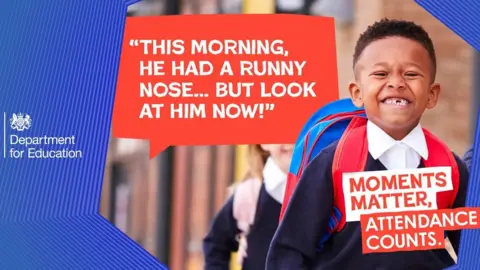Government school attendance campaign criticised by parents
 BBC
BBCParents of children with mental health issues have criticised a new campaign on school attendance.
The government wants parents to send their children to school if they are worried or anxious.
Katie Berrill says her son has not attended his secondary in Northampton for nearly a year due to severe OCD.
"I can't begin to say how angry this makes me feel. It is making parents feel guilty. We would love our children to be able to attend school," she said.
 Katie Berrill
Katie BerrillMs Berrill said her son, who developed severe OCD after the height of the Covid-19 pandemic, was trying to attend school but becoming increasingly anxious.
"He would love to return to school and feels so isolated but the support has not been there," she added.
She said her son had just been assigned an educational psychologist after nearly a year of waiting.
"Parents can struggle to get their children to school for many valid reasons. This campaign comes across as very patronising and ableist and I think the money could have been spent on much better things to support children to get back in school," she added.
More than one in five children in England are persistently absent from school, which is double the proportion before the pandemic, according to data from the Department for Education (DfE).
Ashley Fulwood, chief executive of the charity OCD-UK, said: "Children's mental health services have for years failed to deliver adequate and timely treatment interventions for children and young people affected by OCD.
"As a consequence of that the OCD can have a devastating impact on education, schooling and relationships with friends and family."
According to one study, 92.1% of children with school attendance difficulties were neurodivergent, and many were autistic.
 Emma Fletcher
Emma FletcherEmily Katy, 22, from St Albans in Hertfordshire, has struggled with her mental health since the age of 13. She was sectioned aged 16 on a children's mental health unit before she was diagnosed with autism and later ADHD.
"I was a child who started school, age five, with a huge love of learning. I could read and write before I'd even started. I was inquisitive and curious. Joyful. By the age of 16, I was self-harming just to get through the day.
"I was traumatised by school and exhausted from the relentless panic attacks and anxiety it triggered. I was forced back into the same environment day after day, regardless of its effects."
The blogger and author, who is a trustee of the charity The Autistic Girls Network, said the "relentless attack" on school attendance "directly targets neurodivergent children".
"It is not that they won't go to school and refuse, it is that they can't or are struggling due to their experiences. They are not school skivers."
She added: "Posters like these from the DfE are insulting. They ignore the lived experience of so many."
 Getty Images
Getty ImagesBroadcaster Carrie Grant, who is autistic and has four neurodivergent children, said the campaign was "tone deaf".
"It's us parents who mop up the trauma school causes. Our children deserve better," she added.
She asked the government where it would be when children were "attempting to take their lives, self-harming, not eating, melting down, unable to speak, punching us, losing hope, seeing no future" due to being forced to attend school.
Research from The National Autistic Society shows that only one in four autistic students feels happy at school.
Tim Nicholls, head of influencing and research for the charity, said the campaign "completely misses the mark" and "fails to address the huge barriers autistic children and young people face every day in the classroom".
"School shouldn't be a tick box exercise in attendance. It should be about ensuring all children get the support they need to be able to thrive from well-trained staff who understand their needs.
"Instead of shaming parents and children for low attendance at school, the government should prioritise urgent reform of the education system. We won't accept a world where autistic children miss out on an education, and families are left on the brink of crisis," he said.
Vic Goddard, head teacher of Passmores Academy in Harlow in Essex, said children were missing from classrooms due to mental health funding cuts, poverty and the impact of the pandemic.

Mr Goddard said the government was taking a "punishment-driven approach" and putting schools under pressure to issue fines to parents.
"I think that it will be the biggest single issue, outside outcomes, that schools and heads will be worrying about when Ofsted starts again. If you are not issuing loads of fines then you will be downgraded as that seems to be the only approach the government keeps mentioning."
National Association of Head Teachers general secretary Paul Whiteman said schools needed more than advice on the issue.
"Over the last decade we have seen the crucial support services that used to step in and tackle persistent absence eroded and it is immensely frustrating that the government is only now slowly beginning to realise the impact that has had," he said.
The campaign has also been criticised for encouraging children to attend school if they have a runny nose. Dr Lucy-Jane David, a GP and regional British Medical Association chair, said on X: "An unwell child might really need to be tucked up in bed, resting and getting better, and not sharing their bugs with the rest of the class or the classes relatives."

Conservative Education Secretary Gillian Keegan said last week: "Tackling attendance is my number one priority. We want all our children to have the best start in life because we know that attending school is vital to a child's wellbeing, development, and attainment as well as impact future career success.
"I am hugely grateful to all our brilliant teachers, heads, and everyone whose worked with us to make the progress we've already made."
Labour said it would introduce a national register of children not in school and better mental health support for pupils.
The DfE said it was "important to acknowledge that children with long-term medical or more serious mental health conditions, and those with special educational needs and disabilities may face additional barriers".
"For children who face complex barriers to attendance, schools should have sensitive conversations with children and families and work with them to put support in place for their individual needs," it said.

Follow East of England news on Facebook, Instagram and X. Got a story? Email [email protected] or WhatsApp 0800 169 1830
